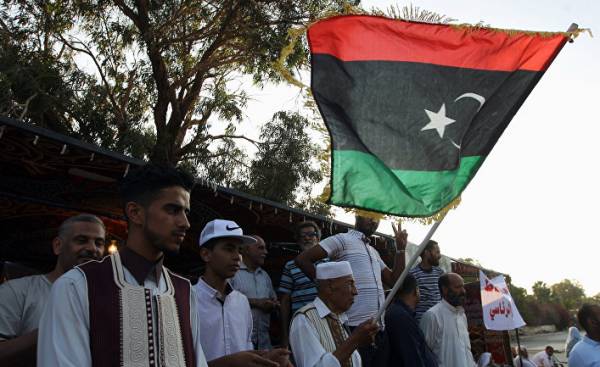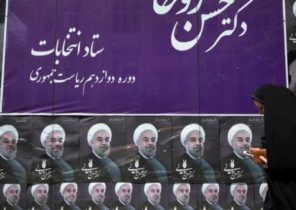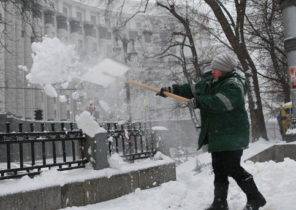
Moscow is trying to act as an arbitrator in disputes between the Haftarot and Sarraj and has positioned itself as an indispensable negotiator.
According to Russian analysts, Russia is ready to increase support for rebel groups in the Eastern region of Libya and to gain a foothold in North Africa, but it does not intend to place its troops there.
The Kremlin decided to become a mediator in the Libyan conflict and to restore its former influence in the Arab country in an effort to deter as Western ambitions, and the threat of “Islamic state of Iraq and the Levant” (a terrorist organization banned in Russia — ed.) in the North African region, said Al Jazeera Kremlin insiders.
However, according to them, at this stage, Moscow may not have the necessary financial or military capabilities to play a something more than just an indirect role in the support of his Libyan ally, the rebel General Khalifa Haftorah.
Since the beginning of this week, the Libyan national army under the command of General Haftorah regained control of two oil ports of RAS lanuf and es-Cider, news reports emerged that Russia has deployed in the region of Benghazi, controlled by the Haftarot, private mercenary troops for operations security, but they were denied by the Russian official sources.
Russia’s support of the Haftarah, which has refused to recognize created through the UN the Tripoli government led by Prime Minister Faiz by Sarraj, foiled the attempts of the West to resolve the situation by political means, involving all the Libyan factions, including the Islamists, to power sharing.
Relying on sponsors such as Russia, Egypt, UAE and France, Haftar have successfully created a stalemate that over time more and more undermines the chances of Caraga to govern the country under the banner of the Libyan political accord (FSC), signed in 2015.
“Russia’s relations with the Haftarot is the result of a simple equation: Russia supports Egypt, the main supporter of the Haftarot,” explained Pavel Felgenhauer, a military commentator from Moscow. “General Haftar has declared war on terrorism, and this coincides with the main goal of Russia in the region: to destroy the terrorist threat posed by “Islamic state”,” Felgenhauer told Al Jazeera.
Felgenhauer confirmed reports about Russia’s use of mercenaries in Libya, saying recently that it is already part of the established practice. He added that the involvement of military resources by helping to avoid political reaction in the country.
“Russia is not sending troops to assist the Haftarot and is unlikely to do so in the near future. We are more inclined to rely on private military contractors and mercenaries. We already use mercenaries in Syria, where they bear heavy losses as are involved in actual combat instead of Russian soldiers. It is very convenient, because they have no political affiliation”.
According to Felgenhauer, hiring private military contributes to the new legal framework regulating the activities of Russian private military companies. In addition to limited financial resources, Russia cannot afford to expand their own military or financial capabilities at the moment, when Moscow is involved in other strategic conflicts in the immediate proximity to its borders.
“Mercenaries are cheaper [of soldiers], and we need to use our financial resources as efficiently as possible. Due to the ongoing conflict in the Donbass, Crimea, Syrian war, Russia has no desire or resources to go to Libya, ‘ said Felgenhauer. Russia wants to gain a foothold in Libya and there have some influence, but the allocation of resources is quite another matter”.
On the question of whether Russia Haftorah in financial and military terms, Felgenhauer said that Russia is prepared to engage with the Haftarot of the case, but it is not going to help for free.
“Russia can offer weapons, military training, logistical support, but in this case we are going to claim some sort of compensation. The Haftarah is oil revenues, and Russia may be ready to exchange.”
The same rhetoric applies to Egypt, the main ally of the Kremlin in the region. Asked to comment on reports in Russian media that the Kremlin was in talks about opening a military base on the border with Libya, Felgenhauer did not deny this information. He said that Egypt has turned to Russia for extensive economic aid, in exchange allowing it to host on its territory of military base.
“We are ready to sell […] to Egypt as long as he is willing to buy. But not for a military base. We have other strategic interests in the Arctic, in the Caucasus, in Central Asia. The President [Abdul Fattah] Al-Sisi will have to compete with other priorities in Russian defense spending,” said Felgenhauer.
Russian analysts agree that Russia’s support of General Haftarot dictated by her fears about the spread of ISIL on the outskirts of Europe and its intention to create a broad anti-terrorist coalition. In addition, Moscow seeks to play a mediation role in Libya, and gives her certain privileges in establishing relations with the leadership of the country in the future.
March 3, Moscow hosted a two-day visit of Faiz Saraga, who met with the Minister of foreign Affairs of Russia Sergey Lavrov and representative of the camp of the Haftarot. According to political commentator, “Kommersant” Sergey Strokan, the meeting was a turning point in the strategy of Russia in Libya.
“Moscow is now able to communicate directly with both parties and play a key role in the future of the conflict. Perhaps Western leaders this result is not too liked, but they formally recognized the role of Russia as potentially useful for resolving the impasse in Libya,” said Strokan Al Jazeera.
“Moscow managed to achieve recognition of the power of the leader of the Haftarot as an indispensable political player. And Russia has earned an official place at the negotiating table after Syria and now in Libya.”
The hidden intention of President Vladimir Putin is to restore Russia’s presence in the middle East and North Africa, as it was in the Soviet Union, using a vacuum left by the United States in the region, where Arab leaders are increasingly convinced in the political departure from the White house from local businesses.
Russian analysts agree that Moscow is trying to become the arbitrator in dispute between General Haftarah and Sarraj and considers himself indispensable negotiator, therefore, by limited investment, providing a future role in the region.
“We do the same against Egypt and Turkey, Israel and Iran. We talk to those who do not want each other to talk. You pay off this strategy? Don’t know, but that’s the idea,” said Felgenhauer. Sergei Markov, Director of the Russian “Institute of political studies” and the Pro-Kremlin voice, presented a completely different view of Russia’s intentions in Libya.
“Libya is a field of confrontation between Russia and NATO. The overthrow of the former regime was folly that led to the collapse of all States to the North African continent. Russia considers it an act of aggression, — said Markov. — Russia felt obliged to intervene and try to do it, pursuing their own interests, although I do not think that now in Libya there is any particular strategy”.
In an interview with Al Jazeera Markov said that Russia is most concerned about the spread of ISIS on vast areas of Libyan territory and the potentially devastating consequences of this phenomenon for Europe. “At the moment, the Haftarah is the most secular figure in Libya, and it was obvious that Russia’s support of Egypt — will make a bet on it”.
But Libyan analysts say that the Russian is characteristic of a simplified vision of local realities and supporting the Haftarot or imposing negotiation model, they will not achieve much.
Six years after the expulsion of former leader Muammar Gaddafi in the country continue unabated crisis and anarchy. The divide runs not only between East and West of the country, in the tribal fabric of the country are decidedly more political players and power centres.
According to Libyan analyst from Turkey NESARA of Krikri, foreign powers on both sides of the conflict have to stop to provoke sectarian tensions, they should work with UN-supported Libyan political agreement is the only legitimate legal basis available today.
“If Russia, Egypt and other countries will continue to provide support to the Haftarot, out of the crisis will not be… Tragic to watch, as a foreign political actors follow the model of many other civil wars, when formally approved the peace agreement and on the sidelines are working for its abolition, said Krekshi. FSC is not perfect, but it’s the only thing we have right now”.
According to Krekshi, the Libyan public opinion is deeply divided on the question of whom to support, because people have lost trust to all involved in the conflict by political figures in Libya, and beyond, with the result that a political solution seems less and less likely.
However, the response to the basic human needs are necessary for people’s hopes for the ability of UN-supported government Caraga to overcome political and economic crisis partly revived, he said.







